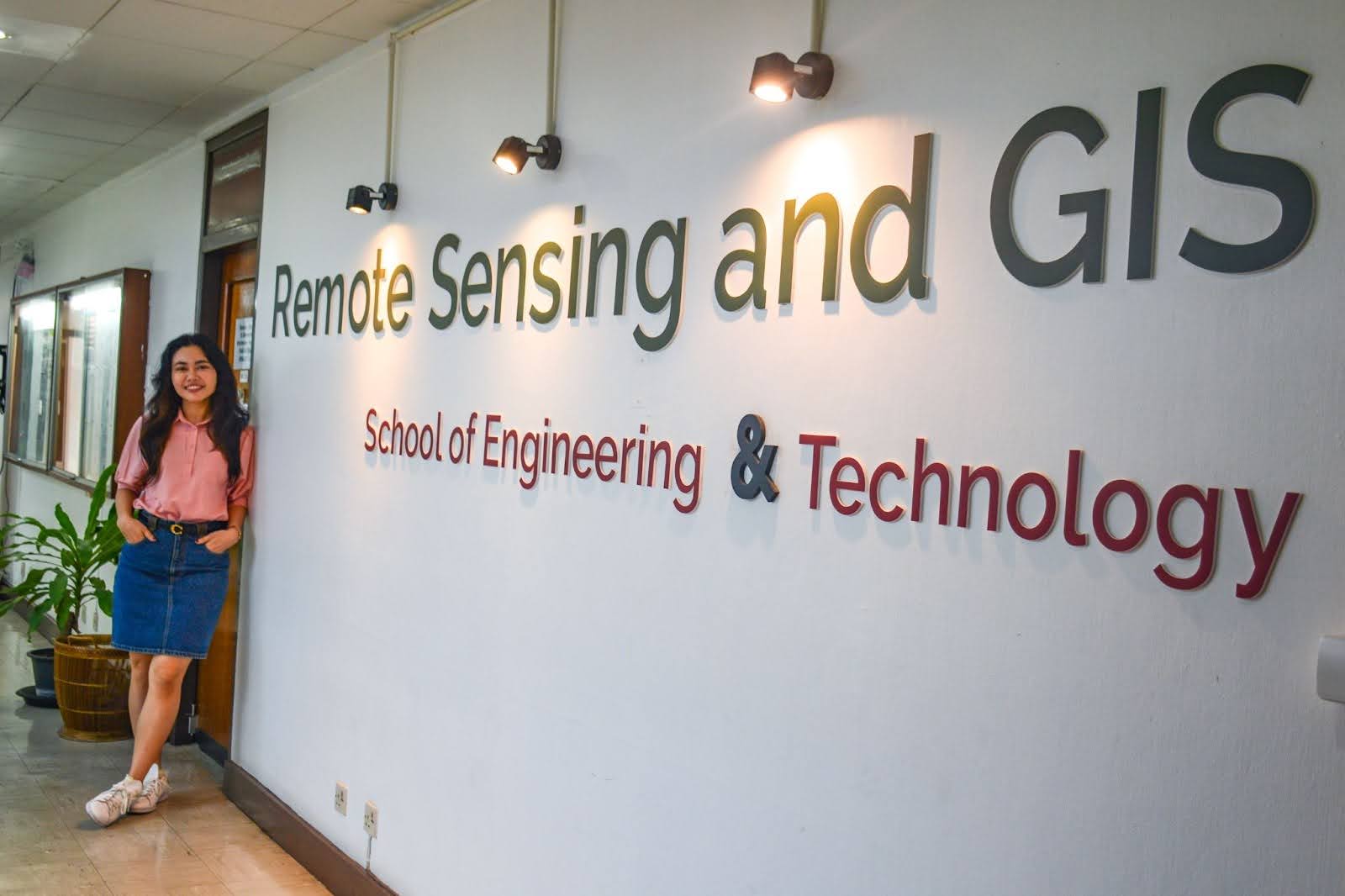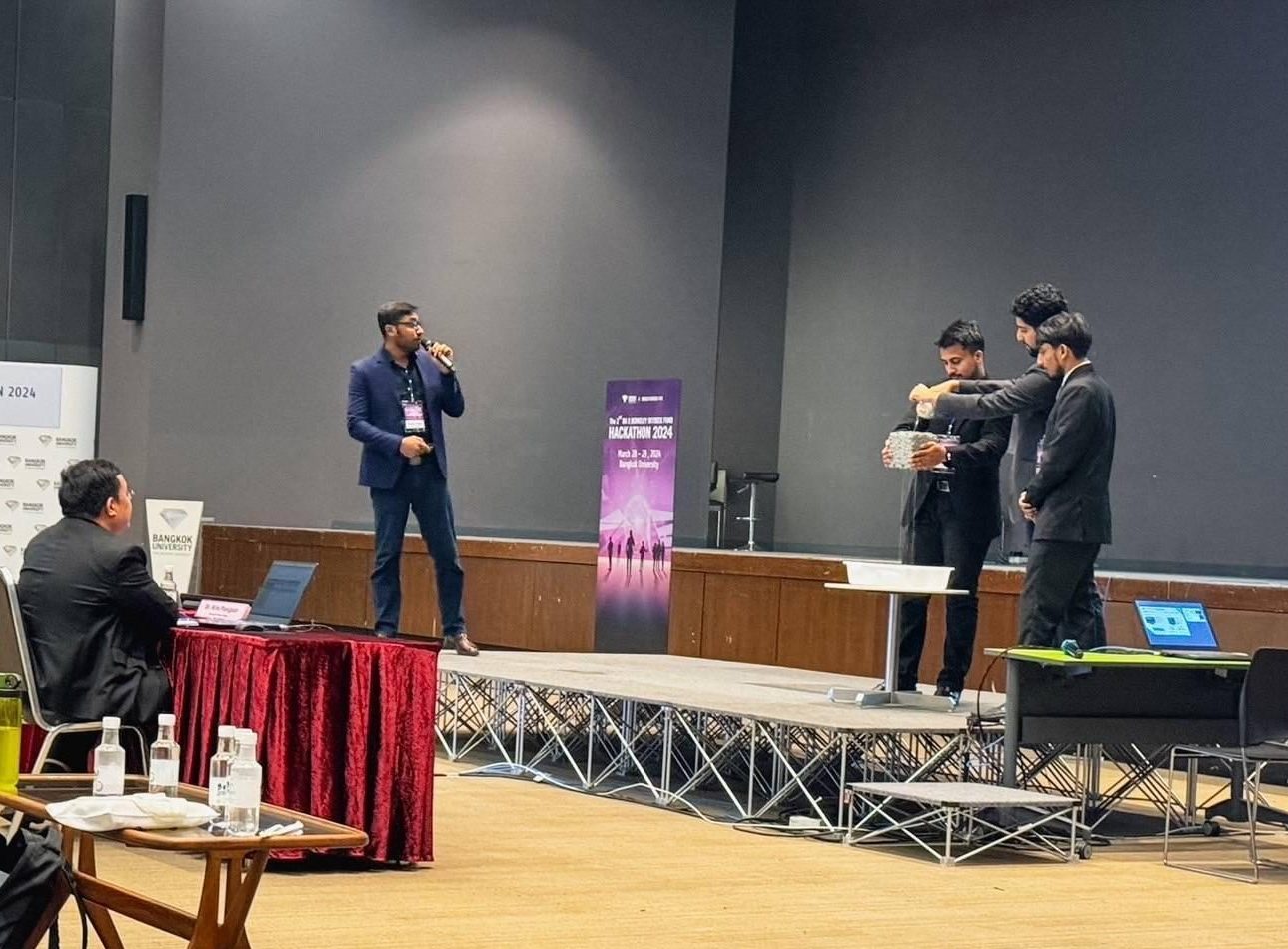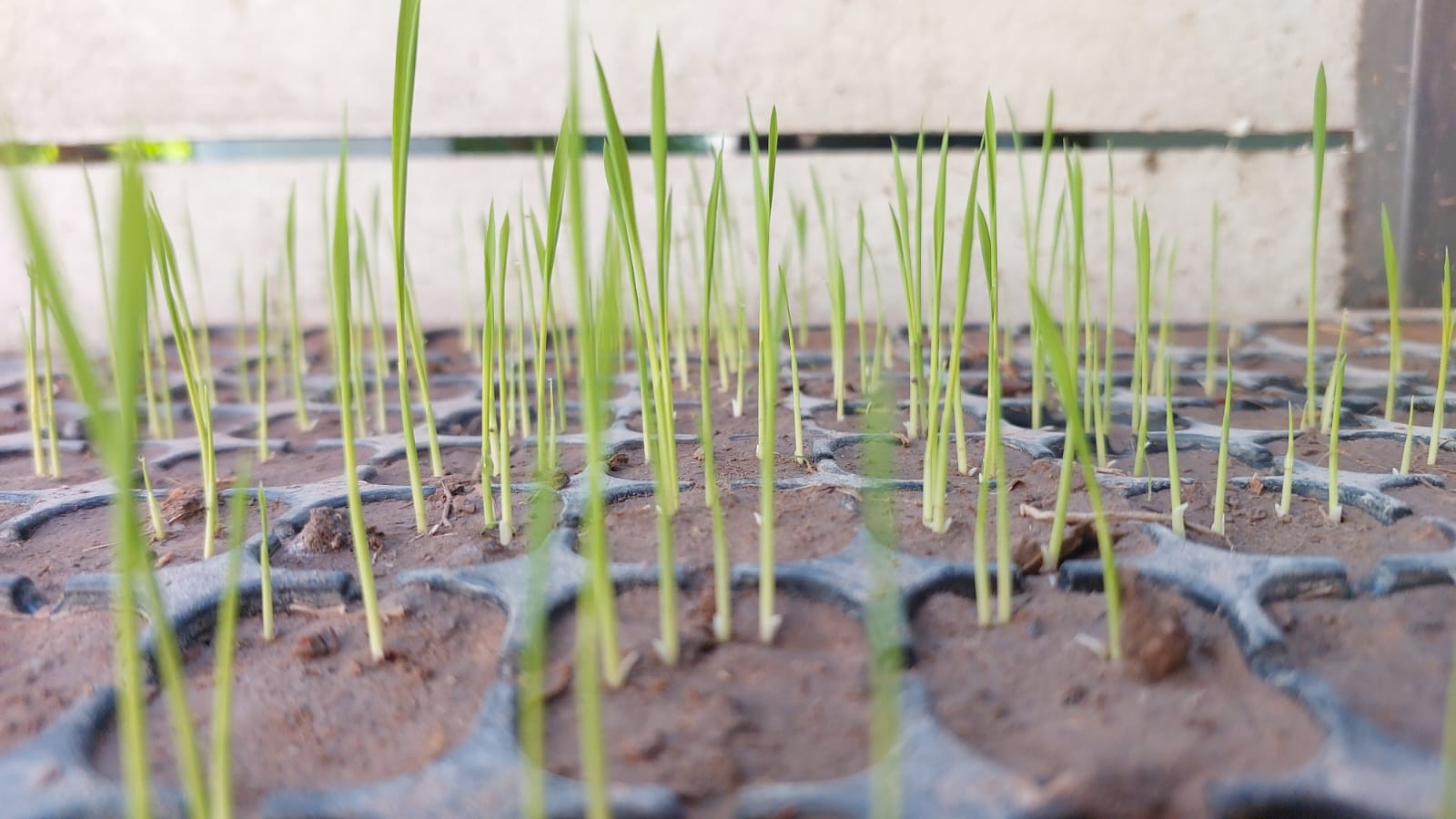By Office of Public Affairs
12 July 2022 — Asian Institute of Technology (AIT) organized an online discussion panel to present initiatives undertaken during the first four years of the prestigious ‘The First Bangabandhu Chair’ (an endowment of Professor and Doctoral Research by the Government of the People’s Republic of Bangladesh in honor of the Father of the Nation of Bangladesh Bangabandhu Sheikh Mujibur Rahman, who led Bangladesh to its independence in 1971) — highlighting accomplishments in knowledge advancement, collaboration, and knowledge dissemination in accordance with Sustainable Development Goals (SDGs) 2030, for the people, the planet and for peace.
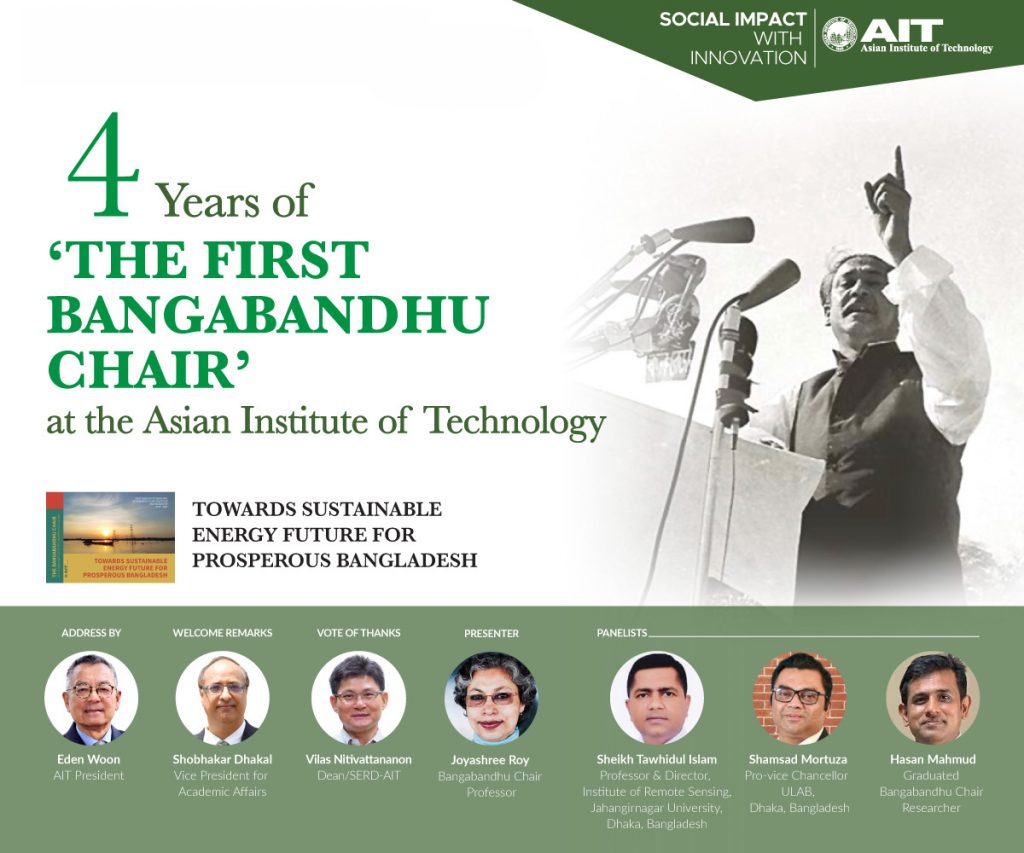
The Bangabandhu Chair was endowed to AIT by the Government of the People’s Republic of Bangladesh in 2018. It is the first doctoral-level Chair named after the Father of the Nation of Bangladesh as a symbol of his dreams and aspirations for a technology-driven ‘Golden Bengal’ (prosperous Bangladesh)— with an objective of conducting research in the Energy sector and any other mutually agreed sector of Bangladesh at AIT.
In the opening remarks, Vice President for Academic Affairs (VPAA) Professor Shobhakar Dhakal cited an inaugural address from Honorable Foreign Minister of Bangladesh Abul Hassan Mahmood Ali in 2018 — that the inauguration of the Bangabandhu Chair marks a historical relationship with Thailand while acknowledging the relationship between AIT and People’s Republic of Bangladesh.
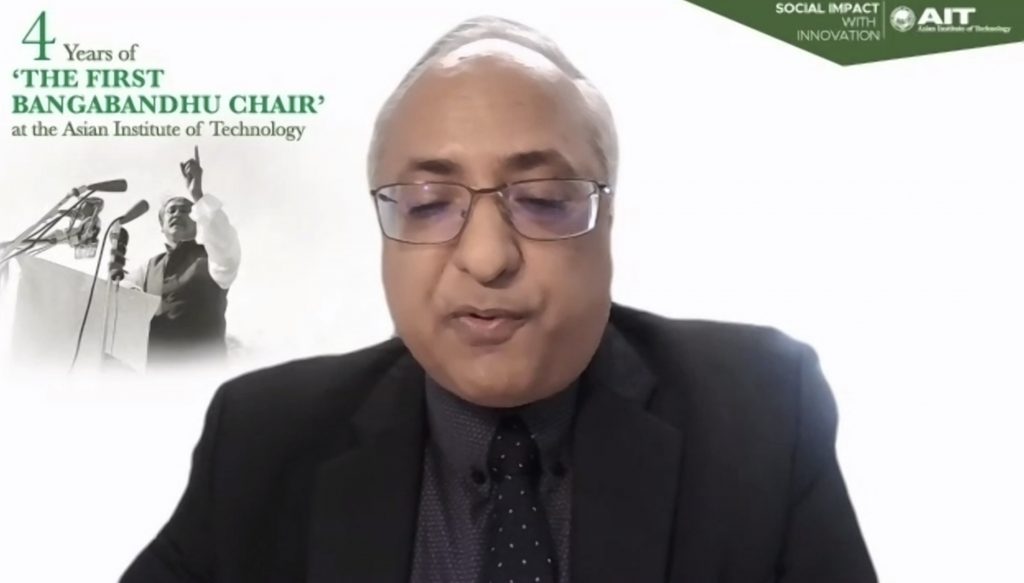
“AIT is very proud to have trained more than 6,000 Bangladeshis scholars and civil servants. With this Bangabandhu Chair, the partnership between AIT and the government of the People’s Republic of Bangladesh has become much stronger than ever — and AIT will continue its collaboration with full heart in the years to come,” Prof. Dhakal remarked.
Bangabandhu Chair Professor at AIT, Prof. Joyashree Roy recalled her vivid memory in 2017 — when she was residing in India, receiving an inaugural letter jointly signed by AIT President and Ambassador of the People’s Republic of Bangladesh Embassy in Thailand— appointing her as Bangabandhu Chair Professor.
“I knew if I accepted the offer of this prestigious endowed named ‘Chair’ position, it would be an immense responsibility. I will need to dedicate myself to the ideal of Bangabandhu, after whom the position is named” Prof. Roy shared her thoughts upon accepting the position.
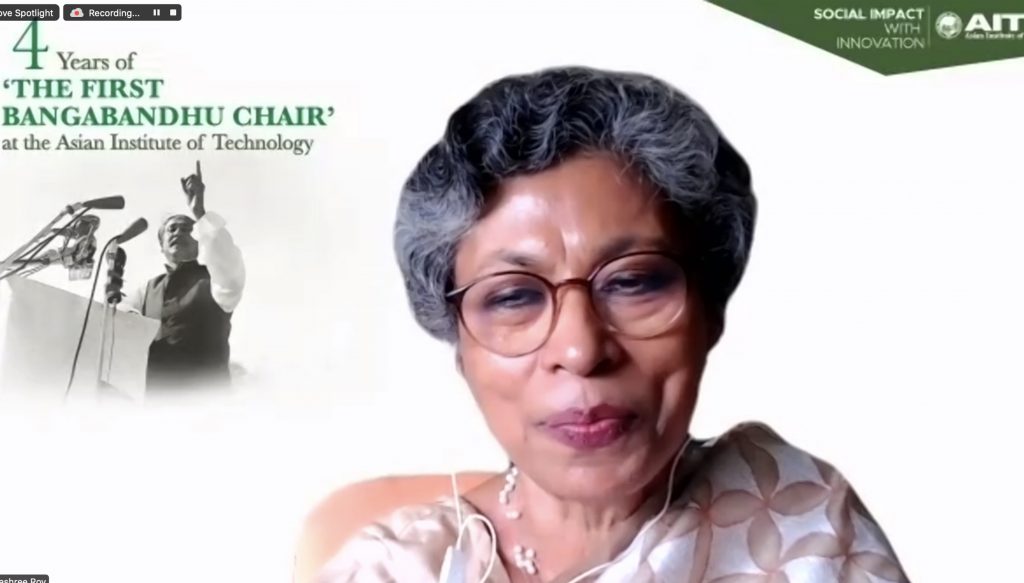
Prof. Roy also mentioned her aspiration for Bangabandhu’s powerful voice for the liberation of human spirit and to flourish with people’s own identity, dignity, and empowerment — and these are the reasons behind her motivation as Bangabandhu Chair Professor.
Director (Entrepreneurship), Bangladesh Energy and Power Research Council, and the Graduated First Bangabandhu Chair Researcher — Dr. Hasan Mahmud shared his journey as the first Bangabandhu researcher at AIT. Despite the rigorous coursework and research, he attributed AIT’s excellent facilities, including the faculty, library, and infrastructure, to his success.
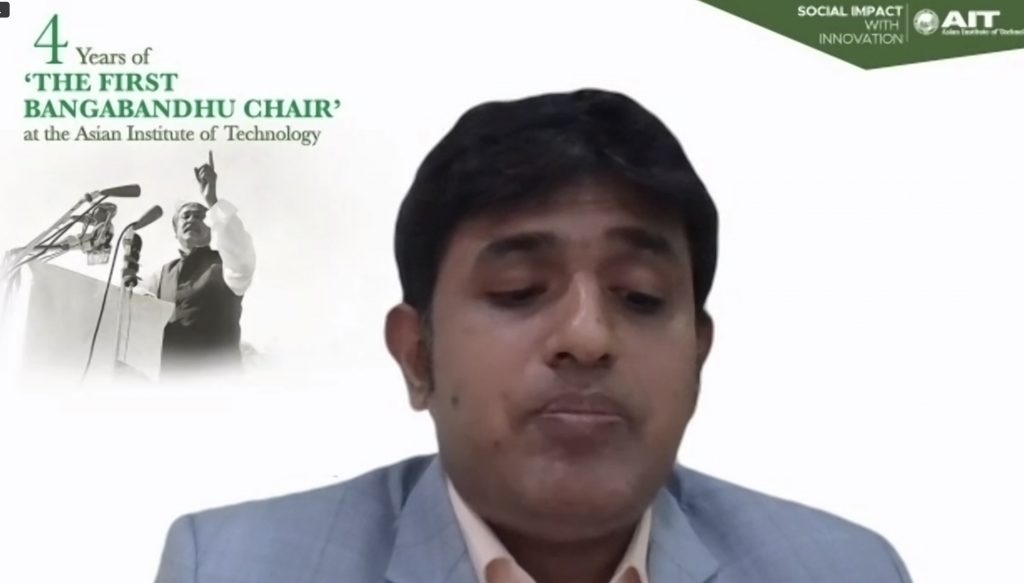
“The encouraging words of our ‘Father of the Nation’ Bangabandhu Sheikh Mujibur Rahman, guidance from Prof. Joyashree Roy, and feedback from doctoral committee members inspired me to enhance my knowledge and research skills in the energy sector and return to serve my country.”, he added. While upon returning to Bangladesh, Dr. Mahmud has been sharing his research findings and implementing them to find pathways for the sustainable energy sector of Bangladesh.
Pro-vice Chancellor at University of Liberal Arts Bangladesh (ULAB), Dhaka, Bangladesh – Prof. Shamshad Mortuza shared the experience of the University of Liberal Arts Bangladesh (ULAB) working in collaboration between ULAB, AIT, and Bangabandhu Chair Professor in the energy transition towards non-fossil fuel renewable energy in Bangladesh.
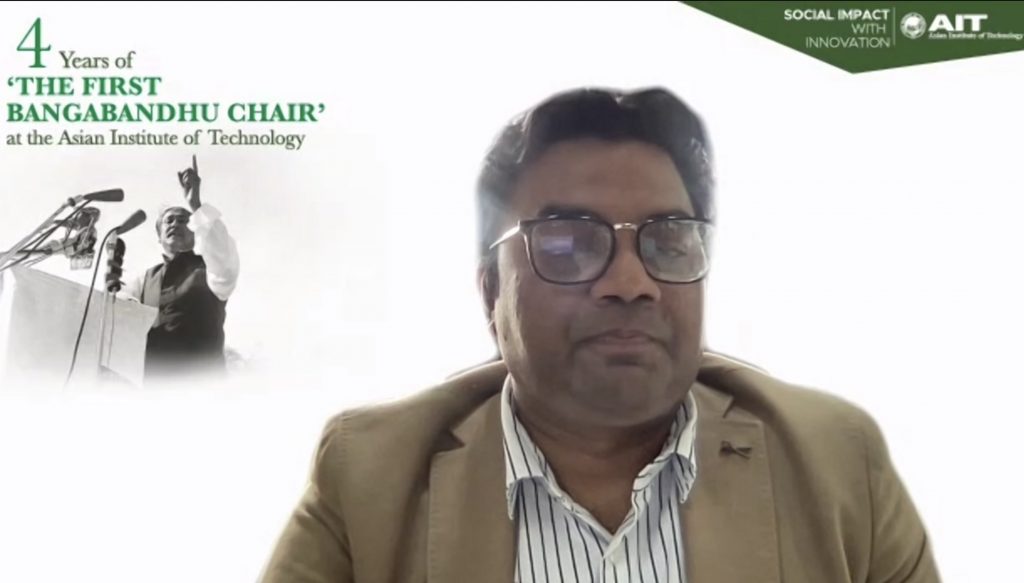
“The establishment of Bangabandhu Chair is an attempt to revisit Bangabandhu and his vision and to signal the world of changing Bangladesh. What started as a simple track to diplomacy has now transformed into a real friendship and global south-to-south connectivity. Thanks to AIT and Prof. Roy we know that there is an active institution at AIT that remembers not only Bangabandhu but also forwards his vision.”, Prof Mortuza stated.
Furthermore, Professor and Director of Institute of Remote Sensing at Jahangirnagar University, Dhaka, Bangladesh – Prof. Sheikh Tawhidul Islam, expressed his gratitude toward AIT and Bangabandhu Chair Professor for their efforts and contribution to featuring Bangabandhu and Bangladesh in the global arena.
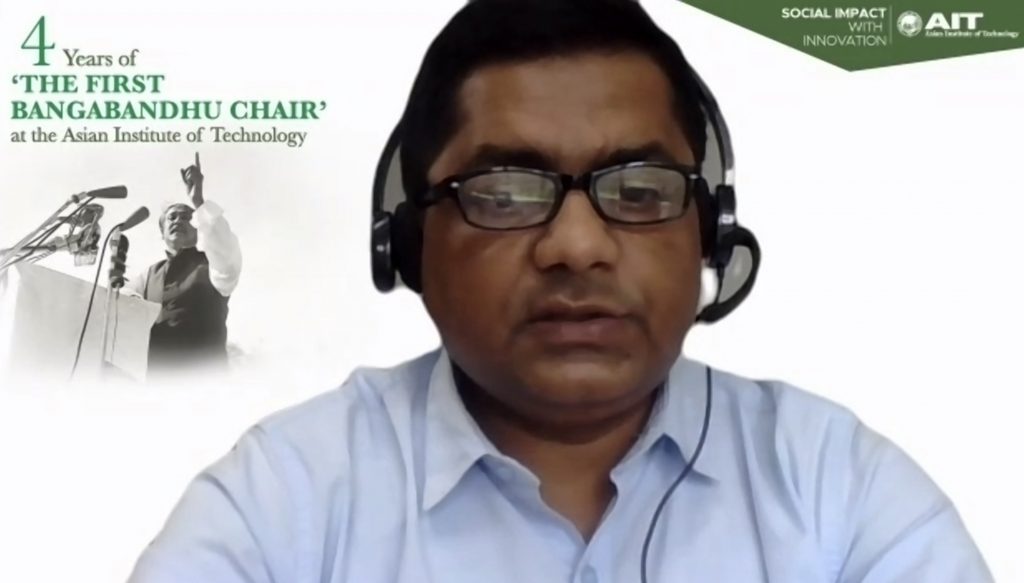
Asserting the important role of research through the program for Bangladesh’s goal of becoming an upper-middle-income country by 2031, he added, “The result generated, and progress made by Bangabandhu chair in AIT in only four years is extraordinary and has demonstrated the pathway for a Leapfrog development”.
“The collaboration between Jahangirnagar University and AIT has strengthened since we started working together. Bangabandhu Chair contributed to training our students to learn new research techniques”, Prof. Islam said, in addition to discussing the collaboration on various research activities and publications.
Meanwhile, Prof. Roy, in response to ‘Golden Bengal’ as a symbol of Sheikh Mujibur Rahman’s dreams and aspirations for technology-driven ideology for the benefit of the people of Bangladesh, underscored Bangladesh has the potential to become a geothermal and hydrogen-based economy. Prof. Roy believes it is when the global economy also emerges along the same line — urging visionary policy and institutions to move towards that from now.
The Bangabandhu Chair Professor shared the matter of the Bangladesh Petroleum Act in 1974 under the leadership of Bangabandhu Shiekh Mujibur Rahman, which enabled the country to chart its actions of modern technology-driven development to attain an ~8% growth rate of GDP in 2019.
Foreseeing the future, Prof. Roy said the next growth phase would need to be driven by efficient end-use technologies, digitization for integrated energy sector development, and repurposed gas infrastructure to induce a hydrogen-geothermal economy.
“However, that needs a new set of institutional reforms and leaders like Bangabandhu Sheikh Mujibur Rahman who could imagine a Golden Bengal which essentially connotes not only modern concept of Sustainable development but much more than that,” Prof. Roy added.
Achievements from the Chair Over the Years
Prof. Roy, who is also a pioneer in various Chair’s accomplishments, demonstrated three fundamental aspects of how the endowed Chair propels advancements with knowledge, collaboration, and dissemination.
She first stated the domain of Knowledge advancement which according to their consultation with national policymakers, experts, and citizens — led to a macro-level understanding of Bangladesh’s Sustainable Energy Transition Issues in view of the national level development aspirations and current distribution of natural resource endowment, fuel choice, technology, demand pattern, and practices and socio-economic condition of the population.
In addition, the Chair could advance the understanding of how such challenges are different today when climate change is posing an additional threat globally and especially for a fast-growing economy such as the context of Bangladesh compared to the Asian predecessors of the past century; how Climate Change and disasters are exacerbating the sustainable development challenges for Bangladesh for the energy sector; and how to reconfigure the energy progress of Bangladesh on sustainable pathways has been attempted after making a very detailed national level data-driven analysis of sustainable energy sector challenges.
“We developed a bottom-up model using official statistics which can be handled by trained researchers and can be dynamically improved to address emerging new challenges and opportunities to address policy-relevant conclusions. Furthermore, we developed qualitative models also to understand barriers to the implementation of SDG7 (Affordable and Clean Energy) in the national context and how they can be prioritized while attempting to overcome the barriers, Prof. Roy exampled.
In the domain of collaboration, the Chair professor was capable of playing an instrumental role in signing an MOU between AIT and the University of Liberal Arts in Bangladesh (ULAB) for a joint degree programme and student mobility. With many other subject experts from a number of institutions in Bangladesh, she could work together laying out a foundation for scholars to publish their research and jointly work with Bangabandhu Chair Professor. All these culminated in preparation of a white paper to inform policy and decision-makers. Chair professor could initiate collaborations between AIT and other global institutions.
In the area of knowledge dissemination, the Chair professor produced two volumes of the peer-reviewed journal named Bangabandhu Chair special issue containing contributions from 70 experts on Bangladesh energy and related sectors worldwide.
To conclude the effectiveness of the initiative in terms of moving toward SDGs 2030 (for the people, the planet, and for peace) — Prof. Roy shed light on research outcomes, findings, and recommendations that have been shared widely to influence impactful decisions. Various policy recommendations were developed backed by scientific evidence to make energy efficiency a priority action; acceleration of reliable, clean, renewable, and modern energy.
With tangible outcomes and impactful initiatives throughout four-year of her utmost contribution to sustainable development, Prof. Roy spoke of her dreams of witnessing the situation of sustainable development in Asia and Beyond that, “there can be various alternative pathways depending on national contexts to make the process of the development sustainable, but every country and continent has no other choice — but to pursue own charted sustainable development path which is consistent with higher human wellbeing”.
AIT President Dr. Eden Woon, in response to the establishment of the Bangabandhu Chair at AIT — underlined that it is a testimony to the strong bond between AIT and the Government of Bangladesh.
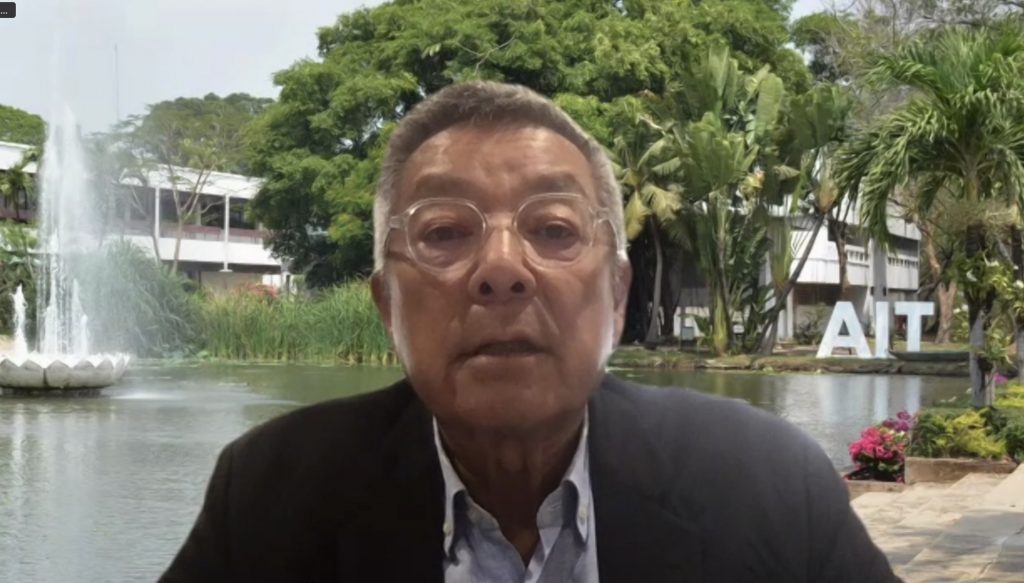
“The Bangabandhu Chair was not only the first initiative by the government of Bangladesh to establish a Chair Professorship named after the Father of the Nation of Bangladesh, Bangabandhu Sheikh Mujibur Rahman, but also the first chair professor that was established at the AIT by a partner Government,” President Woon underscored.
‘Towards Sustainable Energy Future for Prosperous Bangladesh’, A Book to Showcase Four Year Contributions
This online virtual ceremony also hosted the launch of the book titled ‘Towards Sustainable Energy Future for Prosperous Bangladesh’, a book prepared in coffee Table book style and presents a glimpse of the breadth and depth of the work and achievements of the Bangabandhu Chair Professor and Researcher during the first four years under The Bangabandhu Chair at AIT.
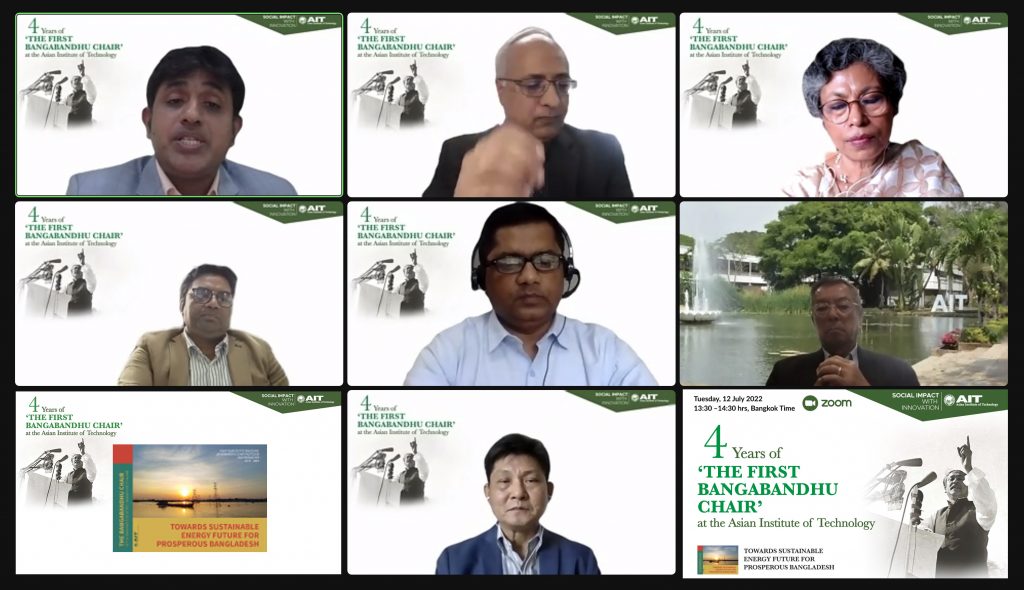
President Woon here explained that the book is prepared in Coffee Table Book style and presents a glimpse of the breadth and depth of the work and achievements of the Bangabandhu Chair Professor and Researcher during the first four years under The Bangabandhu Chair at AIT. Their research objective kept at the center the dream of Bangabandhu to build a ‘Golden Bengal’ to ensure long-term prosperity for the people of Bangladesh. They have rightly pointed out that it cannot happen without a sustainable energy sector.
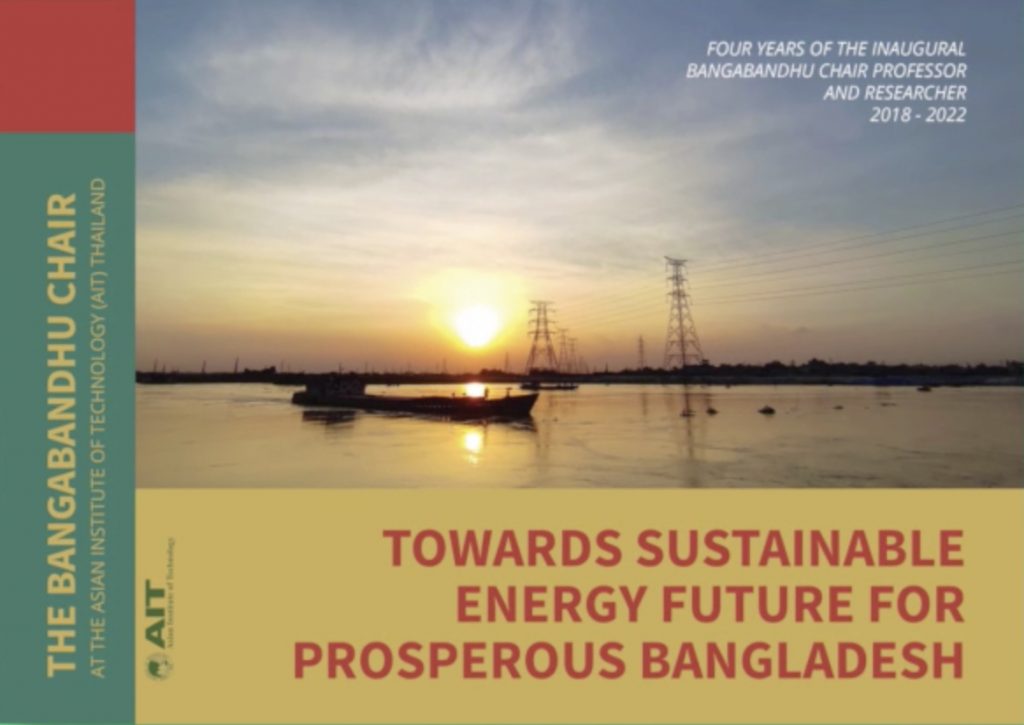
Providing one important excerpt from the book, Prof. Roy highlighted, “Bangladesh is best viewed as a beacon, not a basket case, one that offers important and inspiring lessons about both development and climate adaptation. Those lessons will be no less relevant for Bangladesh’s eventual clean energy transition”.
To conclude the ceremony, the Dean of the School of Environment, Resources and Development (SERD), Prof. Vilas Nitivattanon expressed his sincere gratitude and appreciation to the Government of Bangladesh for endowing the prestigious Bangabandhu Chair Professor to AIT.
“The achievements made during the first four years are a direct outcome of the continuous support from the Government of Bangladesh for the smooth functioning of the program.”, Prof. Nitivattanon concluded.


